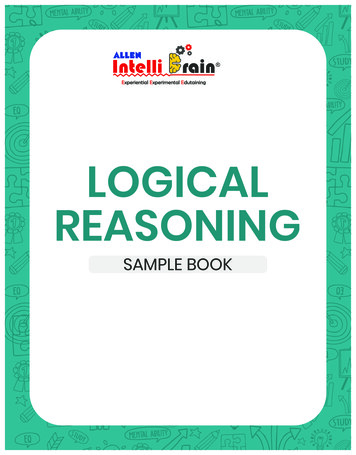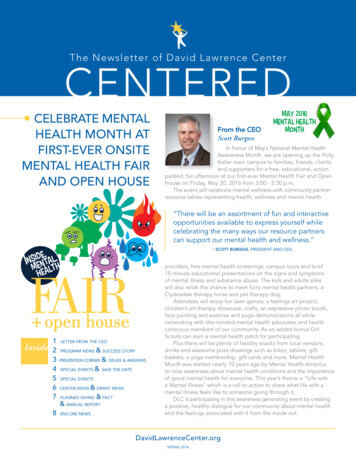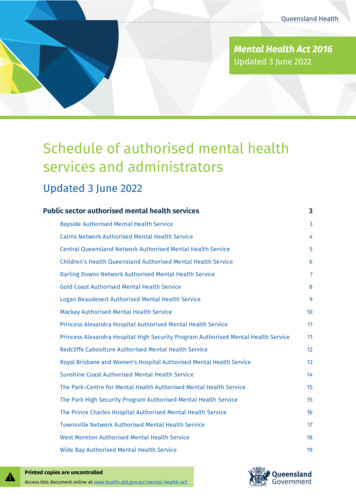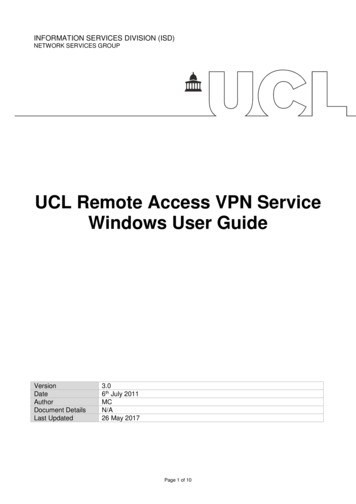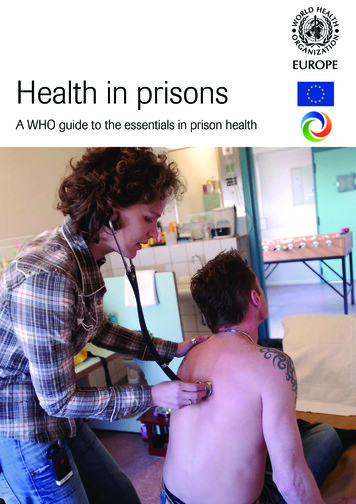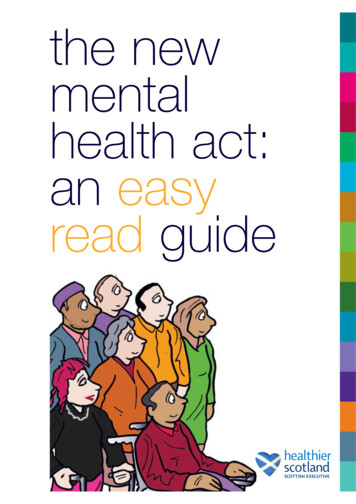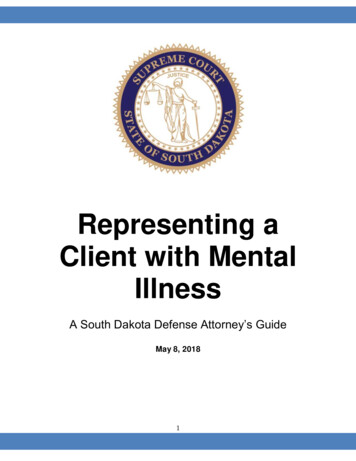
Transcription
Representing aClient with MentalIllnessA South Dakota Defense Attorney’s GuideMay 8, 20181
AcknowledgmentsThis handbook was developed by the South Dakota Unified Judicial System’s StateCourt Administrator’s Office. However, it could not have been created without thesupport of a number of organizations and individuals that assisted in its drafting,review and editing. This handbook draws heavily from the work of TexasAppleseed, who has created similar handbooks in the states of Texas and Louisiana.We wish to thank them for allowing us to reproduce portions of those resourcedocuments in this handbook.2
A Note about This Handbook:This handbook was developed to provide an overview for legal representation forcriminal defendants with mental illness. It was drafted and reviewed by bothmental health professionals and attorneys experienced in criminal law. It is not acomprehensive guide on mental health law or a definitive guide on how to representa mentally ill defendant. It is designed to give attorneys a starting point for theirwork with their clients who have or may have a mental illness, to alert the attorneyto some basic legal options they may want to consider, and to give them some ideasabout where to go for assistance. It is not a substitute for independent legalresearch.3
CONTENTSIntroduction . 6HB 1183 (2017) Overview . 8Top Ten Things to Know About Representing a Client with Mental Illness . 10What is Mental Illness and Why Should you Care? . 13What Is Mental Illness? . 13Serious Mental Illness . 14Why Should You Care If Your Client Has a Mental Illness? . 16Defendant’s Decisions vs. Attorney’s Decisions . 16Checklist for Defense Attorneys. 18Initial Steps . 18The Initial Interview . 20How Can You Tell If Your Client May Have a Mental Illness? . 20What Do You Do If You Suspect Your Client Has a Mental Illness? . 21Helpful Hints To Obtain Information . 23Pretrial Process and Options. 26Confirm that an Actual Case Has Been Filed Against Your Client . 26Talk with the State’s Attorney . 26Release on Bond. 26Involuntary Commitment . 26Competency Examinations . 27The Basics . 27Competence to Stand Trial Examinations . 28When Is It Appropriate To FILE a Motion Seeking a Competency Evaluation? 28Requsting The Competency Evaluation . 29Considerations regarding the competency evaluation. 29Your Responsibilities Regarding the Examination . 30Preparing the Client for the Examination . 30What to Expect in Competency Reports . 30Can your Client “Regain” Competence? . 31Mental Impairment as a Defense. 32Guilty But Mentally Ill. 32Affirmative Defense of Insanity . 324
What happens if your client is found guilty but mentally ill or is acquitted byreason of insanity? . 32Should a Competency Examination and a Guilty but Mentally Ill or InsanityEvaluation be Combined? . 35Expert Mental Health Witnesses, Mitigation and Sentencing Considerations . 37Expert Mental Health Witnesses. 37How Can they Help You? . 37Malingering . 37Mitigation . 38Appendix . 40Glossary of Common Mental Health Terms . 40Some Common Psychiatric Medications. 49Sample Client Interview Form When Mental Illness is Suspected . 50Sample Family Interview Form When Client’s Mental Illness Suspected . 53Bifurcation of Competency and Sanity Evaluations . 55Resources for Help . 58Mental Health Evaluation Forms . 645
INTRODUCTIONEach year, significant numbers of persons with mental illness come into contactwith the criminal justice system nationally and in South Dakota. Followingconcerns about court processing delays for defendants awaiting competencyevaluations and a recognition that there has not been a coordinated effort in thestate to improve the evaluation, diversion, and treatment of persons with mentalillness coming into the criminal justice system, Chief Justice David Gilbertson, withsupport from Governor Dennis Daugaard, established the Task Force onCommunity Justice and Mental Illness Early Intervention in early 2016. The TaskForce included representatives of various system stakeholders including the courts,legislators, counties, defense attorneys, prosecutors, treatment providers, stateagencies, law enforcement and mental health advocates.KEY FINDINGSThe examination of how people with mental illness come into contact with and movethrough the criminal justice system resulted in four key findings: Options to divert individuals from the criminal justice system are statutorilyauthorized, but are not available in all areas of the state; The criminal justice system lacks adequate procedures to identify mentalillness early once an arrest has been made; People with indicators of mental illness are more likely to be detainedpretrial and to stay longer in detention, yet jails are not equipped to addresstheir needs; and, Court orders regarding competency evaluations tripled in a 3-year period,while the common practice of multi-purpose evaluations and wait times forevaluations drove higher costs.One of the recommendations from the Task Force to state leaders was to providetraining to defense attorneys on signs and symptoms of mental illness, eligibilitycriteria and availability of mental health services in South Dakota. Thatrecommendation was adopted by the Legislature and codified in SDCL 23A-40-21.When attorneys recognize clients as mentally ill, they may not be familiar with thespecialized mechanisms, procedures, resources and laws that apply to persons withmental illness. This lack of specific training, sometimes coupled with the client’sdesire to get out of jail quickly or the attorney’s desire to help them get out of jailquickly, may result in a client pleading guilty to an alleged offense when he or she6
is not competent to do so. A lack of understanding of mental illness and treatmentoptions or the availability of local treatment options may also contributesignificantly to delays in court proceedings, longer stays in jail, and frequentrevocations of bond or probation for mentally ill defendants.The Task Force recognized that having procedures in place for screening defendantsat the jail and making referrals for further evaluation if necessary, divertingindividuals from the criminal justice system, and using the leverage of the criminaljustice system to engage in assessment and treatment can all benefit individualswith mental illness that come into contact with the criminal justice system.7
HB 1183 (2017) OVERVIEWAN ACT TO PROVIDE AND REVISE CERTAIN PROVISIONS REGARDING MENTAL HEALTHPROCEDURES IN CRIMINAL JUSTICE, TO MAKE AN APPROPRIATION THEREFORE, AND TODECLARE AN EMERGENCY.HB 1183 was intended to respond to the Task Force’s findings in the followingways:Providing tools to law enforcement and communities to address mental healthcrises early and prevent jail admissions: Sets up a one-time grant program to encourage local governments toestablish or expand crisis response services as a way to divert individualswith mental health concerns away from jailExpands training resources for law enforcement and jails on mental illnessand crisis interventionExpediting the completion of competency exams ensuring speedier court processingand shorter jail stays: Transfers existing funds from the Human Services Center forensic evaluationbudget to a fund administered by the SD Association of CountyCommissioners to reimburse counties for competency examinationsSets a 21-day timeframe for completion of competency examinations andexpands the types of professionals who can perform these examinationsStrengthening opportunities to divert people from the criminal justice system intomental health treatment: Encourages state’s attorneys to use deferred prosecution for defendants withmental illness by providing training on mental illness and available servicesRevises the conditions of bond to allow the court to add as a condition therequirement that a defendant complete a mental health assessment andfollow treatment recommendationsAllows courts to establish multi-disciplinary teams to help plan and managecases for people with mental illnessImproving access to treatment of those with mental illness in the criminal justicesystem through training and studying treatment options:8
Requires training on mental illness for court-appointed criminal defenseattorneys, officers in jails and state prisons, judges and court services officersto encourage appropriate response and available servicesEstablishes a group to recommend ways to improve communication betweenjails and mental health providersContinuing to identify ways to improve criminal justice responses to those withmental illness: Creates a 14-person oversight group to monitor implementation and impactsof the Act, and to continue to study related issues and makerecommendations to state leaders to improve criminal justice responses Pilots the use of a jail mental health screen to establish a procedure for earlyidentification of mental illness, a baseline for how many defendants needfurther mental health assessment, and a process for statewide rollout Requires the Unified Judicial System to track data on probationers assessedand referred for treatment.Endorsing HB 1183: SD County Commissioners Association, SD Sheriff’sAssociation, SD Association of Criminal Defense Attorneys, SD Council of MentalHealth Centers, National Alliance for the Mentally Ill South Dakota, SD Chapter ofthe National Association of Social Workers, Avera Health, SD Association ofHealthcare Organizations, SD Psychological Association, SD Department of SocialServices, SD Unified Judicial System.9
TOP TEN THINGS TO KNOW ABOUTREPRESENTING A CLIENT WITH MENTALILLNESS1. MENTAL ILLNESS AND INTELLECTUAL AND DEVELOPMENTALDISABILITIES ARE NOT THE SAME: Intellectual or developmental disabilitiesare permanent conditions characterized by significantly below average intelligenceaccompanied by significant limitations in certain skill areas, with onset before age18. Mental illness, on the other hand, usually involves disturbances in thoughtprocesses and emotions and may be temporary, cyclical, or episodic. Most peoplewith mental illness do not have intellectual deficits. However, it is possible for aperson with an intellectual or developmental disability to also have a mental illness.See SDCL 27B-1-18; SDCL 27B-1-18.1 and SDCL 27A-1-1(24) (definingdevelopmental disability, intellectual disability and severe mental illness).2. MENTAL ILLNESS AND INCOMPETENCE ARE NOT SYNONYMOUS, ANDYOU SHOULD BE CONCERNED ABOUT BOTH: Keep in mind that competenceto stand trial is different from mental illness. Some clients who are fit to proceed totrial may still have serious mental illness. Even if your client does not have acompetence issue, there may still be significant mental health issues in the casethat you should explore. Remember, however, that if your client is competent tostand trial, he or she makes the final decision about how to proceed with the case.3. YOU OWE YOUR CLIENT ZEALOUS REPRESENTATION: You have theethical obligation to zealously represent your client, which may include exploringyour client’s case for mental health issues. It may also include bringing appropriatemotions if your client’s mental illness has affected his or her case.4. IF YOU SUSPECT YOUR CLIENT IS NOT COMPETENT, REQUEST ANEVALUATION: If you believe your client may not be competent, he or she may notbe able to make informed decisions about fundamental issues, such as whether toenter into a plea bargain agreement or, instead, proceed to trial. Do not allow yourclient to accept a plea bargain, or make any other decisions regarding the case,when you have reason to believe that he or she is incompetent to stand trial.Instead, immediately request a competency evaluation.5. AN INSANITY DEFENSE MAY BE APPROPRIATE: Take the time to properlyinquire about your client’s mental illness and explore various legal and medicaloptions. Your client may share information that will help you decide if you shouldexplore an insanity defense. Keep in mind, however, there may also be10
disadvantages to pursuing the insanity defense, and you should discuss all of thepros and cons with your client.6. MITIGATE, MITIGATE, and MITIGATE: Part of your job as an attorney is toreveal your client’s impairments and disabilities that limit his or her reasoning orjudgment. Conditions that inspire compassion, without justifying or excusing thecrime, can be powerful mitigation evidence. Mitigation evidence can be used toargue for a shorter term of incarceration or for probation instead of incarceration.7. INEFFECTIVE ASSISTANCE OF COUNSEL AND REVERSIBLE ERROR: Anattorney’s failure to request the assistance of a qualified mental health professionalwhen indicated can be a violation of a defendant’s Sixth Amendment right toeffective assistance of counsel. It is important to appreciate that your client’smental illness may impact your obligation to advocate on their behalf.8. OVERCOME YOUR OWN PREJUDICES BEFORE YOU HURT YOUR CLIENTAND THEIR CASE: A popular misconception is that mental-state defenses areattempts by the defendant to deny responsibility for their behavior. Many peopleare skeptical that persons with mental illness are in some circumstances unable tofully appreciate the nature of their acts and control them. This denial of psychiatricdisability can deeply influence the attitudes of both judges and juries toward expertwitnesses and mental health defenses. If you are representing a person with mentalillness you must overcome cynicism toward mental health issues in criminal cases.Mental illnesses are neurobiological brain diseases. A mental illness is a medicalillness. Mental illness can be diagnosed, treated, and managed. You do your client adisservice by representing it any other way.9. INCARCERATION CAN BE PARTICULARLY HARMFUL TO PEOPLE WITHMENTAL ILLNESS: Jails can be very damaging to the stability, mental health, andphysical health of individuals with mental illness. Numerous studies show thatplacing mentally ill persons in single cells, isolation, or “lock down” can worsen theirschizophrenia, depression, and anxiety. Individuals with mental illnesses are alsomore likely than others to be victimized by other inmates. They may also be unableto access certain medications in the jail setting. You should visit with your clientregularly and communicate about the case while they are incarcerated.10. DO NOT LET YOUR CLIENT GET CAUGHT IN THE “REVOLVING DOOR”:Many adults with mental illness are arrested for minor offenses that directly relateto their illness or poverty. They cycle repeatedly through the courts and jails,charged with the same petty offenses. This "revolving door" is not only a burden tothe courts and the criminal justice system, but it is also costly to society, to theseindividuals, and to their families. By quickly pleading your client to "time served"without exploring your client’s mental illness, you may lose the opportunity to helpthem get better so that he or she does not reoffend. Attorneys should do their best to11
link mentally ill defendants to appropriate treatment or services that will help themkeep out of trouble. While it is important to get your client out of jail as soon aspossible, it is equally important to keep him or her from returning to jail. Releasingpersons with mental illness back into the community with no plan for treatment oraftercare is a recipe for revocation and recidivism. Don’t set up your client to fail.12
WHAT IS MENTAL ILLNESS AND WHYSHOULD YOU CARE?WHAT IS MENTAL ILLNESS?South Dakota law defines mental illness in the criminal code as “any substantialpsychiatric disorder of thought, mood or behavior which affects a person at the timeof the commission of the offense and which impairs a person's judgment, but not tothe extent that the person is incapable of knowing the wrongfulness of such act.Mental illness does not include abnormalities manifested only by repeated criminalor otherwise antisocial conduct.” SDCL 22-1-2(24).Mental disorders are quite common. In fact, one in four Americans has some type ofmental disorder in any given year.1 About 8 percent and 15 percent of all peoplewith mental illness and serious mental illness, respectively, will have a co-occurringsubstance use disorder,2 although the percentage in the criminal justice system ismuch higher; 50-60 percent of the jail and prison population has a significantmental illness (schizophrenia, bipolar disorder, or major depressive disorder) at anygiven time.3 This far exceeds the rate for these disorders in the general population.There is a myth that persons with severe mental illness are significantly moreviolent than other people. However, research shows this is not true.4 In fact, thevast majority of persons with mental illness in jail are arrested for nonviolentoffenses. Often, it is when people with mental illness are undiagnosed, untreated, orthey stop taking their medication, that they get in trouble with the law or are justas likely to become victims of crime.Ronald Kessler et al., Prevalence, Severity, and Comorbidity of Twelve-month DSM-IV Disorders inthe National Comorbidity Survey Replication, 62 ARCHIVES OF GEN. PSYCHIATRY 617-27(2005).1Kristen Harris & Mark Edlund, Use of Mental Health Care and Substance Abuse TreatmentAmong Adults with Co-occurring Disorders, 56 PSYCHIATRIC SERVICES 954-59 (2005).2“These estimates [of mental illness in the population] represented 56% of State prisoners, 45% ofFederal prisoners, and 64% of jail inmates.” DORIS J. JAMES & LAUREN E. GLAZE, BUREAU OFJUSTICE STATISTICS, MENTAL HEALTH PROBLEMS OF PRISON AND JAIL INMATES 1(2006), available at ry J. Steadman et al., Violence by People Discharged From Acute Psychiatric InpatientFacilities and by Others in the Same Neighborhoods, 55 ARCHIVES OF GEN. PSYCHIATRY 3934401 (1998).13
SERIOUS MENTAL ILLNESSSevere mental illness is defined as “substantial organic or psychiatric disorder ofthought, mood, perception, orientation, or memory which significantly impairsjudgment, behavior, or ability to cope with the basic demands of life. Intellectualdisability, epilepsy, other developmental disability, alcohol or substance abuse, orbrief periods of intoxication, or criminal behavior do not, alone, constitute severemental illness.” SDCL 22-1-2(24).There are a variety of mental illnesses, and the severity of each ranges from mild tolife-threatening. Many serious mental illnesses, such as those listed below, arechronic in nature but can be managed with the proper medication and treatment.Schizophrenia is a mental disorder that impairs a person’s ability to think, makejudgments, respond emotionally, remember, communicate, interpret reality, and/orbehave appropriately. This disorder grossly interferes with the person’s capacity tomeet the ordinary demands of life. Symptoms may include poor reasoning,disconnected and confusing language, hallucinations, delusions, and deterioration ofappearance and personal hygiene.Bipolar disorder or manic-depressive illness is characterized by a person’s moods,alternating between two extremes of depression and mania (exaggeratedexcitement). The manic phase of bipolar disorder is often accompanied by delusions,irritability, rapid speech, and increased activity.Major depressive disorder is much more severe than the depression that most of usfeel on occasion. People suffering from major depression may completely lose theirinterest in daily activities; feel unable to go about daily tasks; have difficultysleeping; be unable to concentrate; have feelings of worthlessness, guilt, andhopelessness; and may have suicidal thoughts.Other common mental disorders or mental illnesses are defined in the Glossary inAppendix. Many of these disorders are also disabling and can profoundly affect theway a person thinks, behaves, and relates to other people. As an attorney, you canhelp ensure the fair administration of justice by recognizing those defendants whohave mental illness.Serious Mental Illness (SMI) refers to situations when individuals over the age of 18with diagnosable mental health disorders experience functional impairments thatsignificantly interfere with daily living.The following services are available to those diagnosed with a SMI:14
Comprehensive Assistance with Recovery and Empowerment Services (CARE)includes outpatient counseling, case management, and psychiatric medicationmanagement for adults diagnosed with a serious mental illness.CARE eligibility criteria includes one of the following: Undergone psychiatric treatment more intensive than outpatient care more thanonce Single episode of psychiatric hospitalization with a major mental health diagnosis Treated with psychotropic medication for at least one year Frequent crisis contact with a CMHC or behavioral health provider for more than6 monthsAnd at least three of the following: Unemployed or limited job skills, poor work history Exhibits inappropriate social behavior resulting in concern by the community orrequests for mental health or legal intervention Unable to obtain public services without assistance Required public financial assistance for out-of-hospital maintenance or difficultybudgeting public financial assistance or requires ongoing training in budgets skillsor needs a payee Lacks social support systems in a natural environment or lives alone and isisolated Unable to perform basic daily living skills without assistance.Individualized and Mobile Program of Assertive Community Treatment (IMPACT)provides medically necessary treatment, rehabilitative, and support services foradults who require more intensive services than can be provided through the CAREprogram. The IMPACT Team is a mobile group of mental health professional whomerge clinical, medical, rehabilitation, and staff expertise within one servicedelivery team under the supervision of a clinical supervisor.IMPACT eligibility criteria includes: Medical necessity as determined by a clinical supervisorMeet the Severe Mental Illness CriteriaApproved by the Division of Behavioral HealthVoluntary consent from individual to receive IMPACT servicesNo other appropriate community-based mental health service is availableAnd at least 4 of the following:15
Has persistent or recurrent difficulty performing daily living tasks except withsignificant support or assistance from others such as friends, family, relatives, orcommunity mental health providers; Has frequent psychiatric inpatient hospitalizations within the past year; Has constant or cyclical turmoil with family, social, or legal systems or inabilityto integrate successfully into the community; Is residing in an inpatient, jail, prison, or residential facility and clinicallyassessed to be able to live in a more independent living situation if intensiveservices are provided; Has an imminent threat of losing housing or becoming homeless; or Is likely to need residential or institutional placement if more intensivecommunity-based services are not provided.WHY SHOULD YOU CARE IF YOUR CLIENT HAS A MENTALILLNESS?Your client’s mental illness may affect various aspects of his or her case, such as: The voluntariness of your client’s statements; Your client’s ability to understand the rights explained to him or her,including Miranda rights; The reliability of your client’s statements; Your client’s memory, ability to make decisions, reasoning, judgment,volition, and comprehension; Your client’s ability to understand cause and consequence or learn from priormistakes; Your client’s ability to waive rights in a knowing, intelligent, and voluntarymanner, including the right to counsel, right to be present, right to assist,right to trial and appeal, and right to testify; and/or Your client’s ability to meaningfully participate in trial preparation and attrial.DEFENDANT’S DECISIONS VS. ATTORNEY’S DECISIONS16
Even if your client has a mental illness and impaired capacity, it is important toremember that the client still retains final decision-making authority over keyaspects of the case, namely: Which plea to enter. Whether to waive a jury trial. Whether to testify on his or her own behalf. Whether to appeal. Whether to represent himself or herself. The objective and general methods of representation (i.e., counsel is requiredto consult with the defendant on “important decisions” regarding overarchingdefense strategy).Some strategic decisions to be made by the lawyer after full consultation: Which witnesses to call. Whether and how to conduct cross-examination. Which trial motions to make. All other strategic and tactical decisions.17
CHECKLIST FOR DEFENSE ATTORNEYSThis checklist is intended to help an attorney recognize a clientwith mental illness. It is not intended to speculate on adiagnosis.INITIAL STEPS1. Ask the client questions to determine if the client has a mental illnessdiagnosis. See Appendix (Sample Client Interview Form).o Interview the client as soon as possible.o Ask about the facts of the case.o Ask the client whether he or she has been treated for any type ofmental illness.o Review medical records, if available, or ask for a release to obtainthem.o Talk to the family.o Interview witnesses.o Inform the client of his or her right to a jury trial or a trial before thecourt and the right to be present at hearings, to confront witnesses, tocross-examine witnesses and not to be called as a witness againstthemselves.2. Seek to have the client released from jail on bond, if possible. Review SDCL23A-43-4 (factors to consider in determining conditions of release including“character and mental condition, the results of any mental healthassessment”) and SDCL 23A-43-5 (conditions of release may includerequiring the defendant to “complete a mental health assessment by aspecified date and follow any treatment recommendations").3. Consider whether an evaluation for competency may be appropriate. Failureto do so early on can result in unnecessary delays and longer periods ofincarceration for the client.18
4. Familiarize yourself with options available in your community. Talk tomental health professionals, mental health advocates, and experienceddefense attorneys.5. Familiarize yourself with the civil commitment procedures as they may beapplicable to your client’s case.6. If necessary explain your client’s absence to the court at meetings orhearings.7. Determine if you need an independent mental health evaluation.1911
THE INITIAL INTERVIEWHOW CAN YOU TELL IF YOUR CLIENT MAY HAVE A MENTALILLNESS?Here are some things you should look for when trying to identify a potential mentalillness:Behavioral or physiological clues. Your client may exhibit certain behaviors orcharacteristics that may indicate a
mental health professionals and attorneys experienced in criminal law. It is not a comprehensive guide on mental health law or a definitive guide on how to represent a mentally ill defendant. It is designed to give attorneys a starting point for their work with their clients who have or may have a mental illness, to alert the attorney
